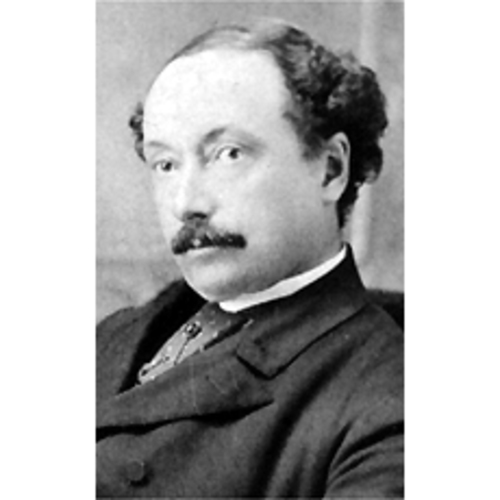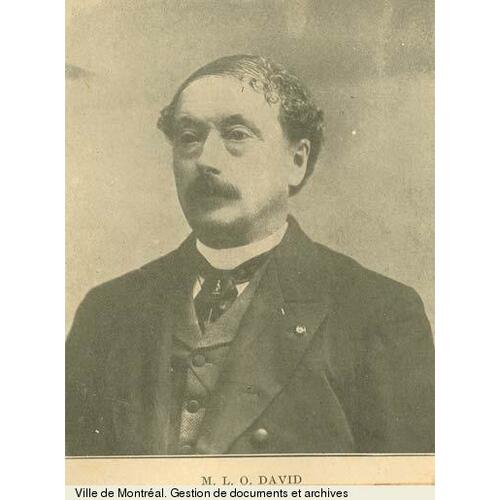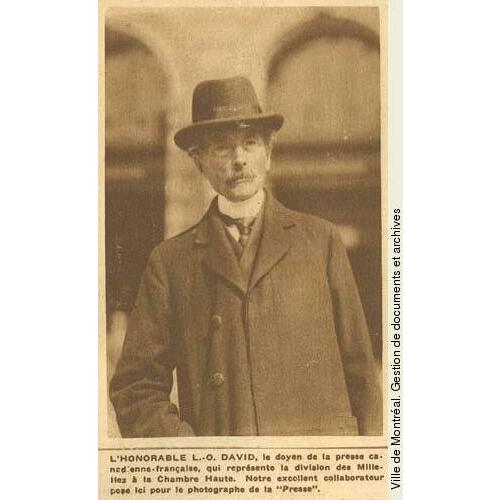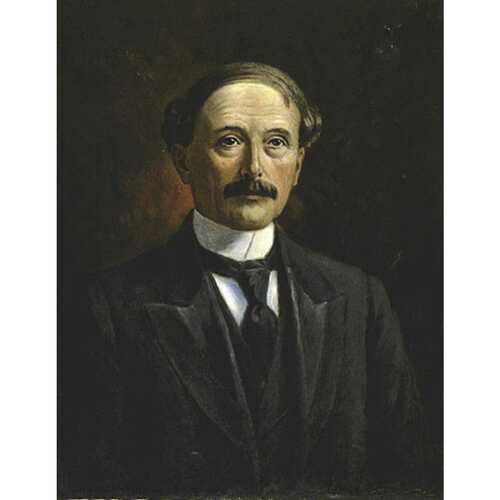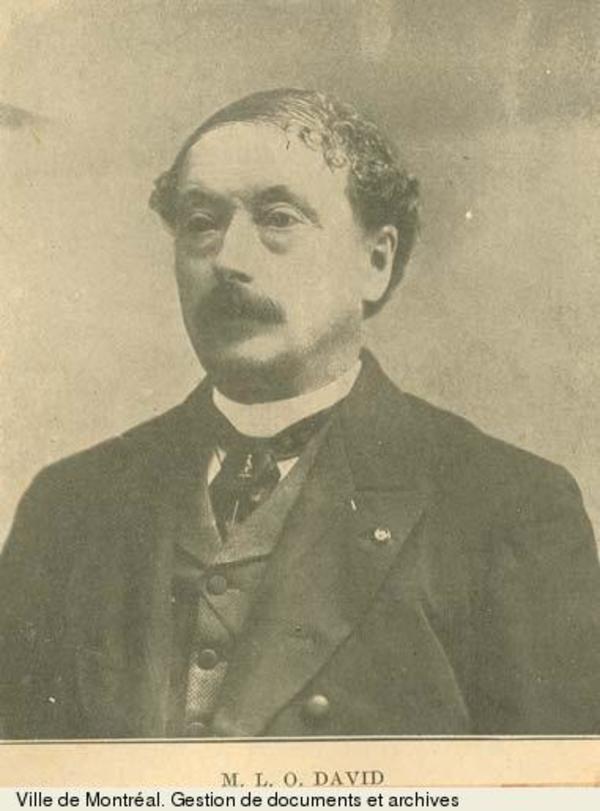
Source: Link
DAVID, LAURENT-OLIVIER, journalist, newspaper owner, author, lawyer, office holder, and politician; b. 24 March 1840 in Sault-au-Récollet (Montreal), son of Stanislas David, a farmer and militia captain, and Élisabeth Tremblay; m. first 1 July 1869 Albina Chenet at Quebec, and they had one son and ten daughters; m. secondly 18 Oct. 1892 Ludivine Garceau in Boston; they had no children; d. 24 Aug. 1926 in Outremont, Que.
Laurent-Olivier David achieved high standing in his classical studies at the Petit Séminaire de Sainte-Thérèse, where, as he later noted in Les gerbes canadiennes, he “worked hard, studied, laughed often, and sometimes wept.” He then enrolled in the law school of François-Maximilien Bibaud* at the Collège Sainte-Marie in Montreal. Called to the Montreal bar in April 1864, he practised with Joseph-Alfred Mousseau*, a future Conservative premier of Quebec, in a partnership that lasted until September 1872. His life would not be confined to the law, however. Patriotic fervour had already welled up within David, and he would never lose it.
As a law student, he was a member of the Cercle Littéraire, a group organized by the founders of the Cabinet de Lecture Paroissial that had been created in opposition to the Institut Canadien in Montreal and hoped to attract students in law and medicine. At the meeting it held on 1 Oct. 1861, he delivered a lecture entitled “Essai sur la littérature nationale,” which was published on 12 October in L’Écho du Cabinet de Lecture Paroissial in Montreal; in it he expressed the wish that literature might become “the faithful expression of the natural beauties of our country.”
In January 1862, with a group including Mousseau, Ludger Labelle*, Louis-Victor Sicotte*, and Joseph-Adophe Chapleau* (another future Conservative premier of the province), David became a co-owner of the Conservative Colonisateur. He and André-Napoléon Montpetit were its sole editors when this Montreal newspaper ceased publication in June 1863. David then became an editor with L’Union nationale, an antifederalist newspaper founded in Montreal in 1864 by Médéric Lanctot*, C.-E.-E. Bouthillier, Toussaint Thompson, and Labelle. On 3 September its prospectus mentioned that the founders “had often fought under other colours. Today, they understand that the reconciliation of parties is the country’s salvation.” According to its editors, Canadian confederation was in no way necessary and indeed threatened to cause conflicts in Lower Canada. It was while working at this paper (which would cease publication in November 1867, shortly after confederation) that David met Wilfrid Laurier*. Their friendship would last until the end of Laurier’s life.
In L’Union nationale, David wrote a scathing criticism of a lecture entitled “Le principe des nationalités,” which had been delivered by Gonzalve Doutre* on 1 Dec. 1864 at the Institut Canadien in Montreal and had appeared shortly afterwards in Le Pays, a Liberal newspaper in that city. On this occasion David revealed himself a conservative far removed from the liberal ideas of Doutre. That this was a period of transition for liberalism should be noted. On the one hand, French liberal ideas, British liberalism, and a degree of religious liberalism were beginning to undermine traditional thinking. On the other hand, the Institut Canadien, the centre for the Rouge movement in Montreal whose objectives David supported (though he was not a member), was heading into decline.
With the coming of confederation, David shifted his political allegiance. He moved from the Conservatives to the Liberals and became active in politics. He was defeated in the constituency of Hochelaga by Louis Beaubien* in the provincial election of 1867. As David would note in La jeunesse et l’avenir . . . (which came out at Montreal in 1926), Beaubien was an “educated farmer [and] forceful speaker who naturally had the support of the agricultural class” in a vote where the pastoral letters of bishops and the sermons of curés were highly influential. He continued practising law until 1870, when along with Mousseau and George-Édouard Desbarats* he founded the Montreal weekly L’Opinion publique. He would be its editor-in-chief from 1 Jan. 1870 until he resigned in 1873.
In this first-rate publication, David got into his stride and conveyed the essence of the intellectual constants and ambiguities that would stay with him all his life. The weekly’s political allegiance is hard to define. Nationalist with a liberal bent that was sometimes tenuous, the periodical seemed made in the image of its editor-in-chief. David’s pen turned out reflections on politics, business, the economy, colonization, industrialization, and relations with the United States. On the subject of the province’s educational system, David believed that it produced too many priests and members of the liberal professions, and that it was not well adapted to the country’s needs. On 5 Feb. 1870 he asked: “What use will it be for French Canadians to speak Greek and Latin, if they are found incapable of filling all the lucrative jobs, if the best positions are denied them, if the doors are closed to them at all those business establishments where thousands of our English compatriots find a decent living?” Nonetheless, in a collection of essays, entitled Au soir de la vie, which was published in Montreal in 1924, David would write with pleasure about Cicero, Pliny the Younger, Socrates, Plato, and Aristotle. His articles on religion demonstrate his faithfulness to the church.
It was in L’Opinion publique that David began his “Galerie nationale,” a series of portraits of personalities such as Bishop Ignace Bourget*, Joseph-Rémi Vallières* de Saint-Réal, and Emma Albani [Lajeunesse]; these articles would be picked up again and printed as volumes (some quite slim). He also published in the paper a collection of texts entitled “Les hommes de 37–38” that would serve as the background for Les Patriotes de 1837–1838, a work brought out in Montreal in 1884. Jean-Olivier Chénier*, Ludger Duvernay*, and Bonaventure Viger* are among those who figure in it. In his essays on the Patriotes, David portrays them as heroes who, by defying authority, caused Bishop Jean-Jacques Lartigue* to issue his famous pastoral letter of 24 Oct. 1837. To the bishop who had described them at that time as brigands, rebels, and bandits, he would reply in Le clergé canadien: sa mission, son œuvre, a pamphlet published in Montreal in 1896, “Let us say in passing that a few of these bandits later became the leaders of the Conservative party and the idols of the clergy before whom the people were duty bound to bow down.” Such musings on the Patriotes occur regularly in David’s writing, which suggests that he encouraged rebellion and rejection of authority. Indeed in 1892 curé Louis-Eugène Duguay would complain to Bishop Louis-François Laflèche* that Les Patriotes de 1837–1838, a seditious book, was being given as a prize in the schools in his diocese. Towards the end of 1873 David left the newspaper in which he had expressed most of his ideas. He resigned because, unlike his colleagues, he did not want to defend a government mired in the Canadian Pacific Railway scandal. “What a lot of disappointments and problems this exaggerated concept of honour in this affair brought me,” he would admit in Souvenirs et biographies, 1870–1910.
In Montreal in April 1874, David became cofounder and co-owner, with Cléophas Beausoleil*, of Le Bien public. It was the official organ of the Parti National, formed in 1871 by Laurier, Louis-Amable Jetté*, Frédéric-Ligori Béïque*, and Honoré Mercier*, among others. David would declare in Mes contemporains that the party had been “only a decoy, a strategic ploy invented to bring the Liberal party to power.” In Le Bien public, David and Beausoleil proved a bit too liberal on the subject of relations between church and state. Always on guard, the ultramontanes were not slow to reply. The newspaper, which was condemned from the pulpit, ceased publication on 20 May 1876, out of loyalty “to its program in favour of a protective tariff,” as David would note in his Mélanges historiques et littéraires. But according to Mason Wade in Les Canadiens français, de 1760 à nos jours, which was published in Ottawa in 1966, the journalist took “refuge from the ultramontane storm as translator at Ottawa,” a position he obtained in May 1876, thanks to Laurier, and held for two years. Six months after the disappearance of Le Bien public, Bishop Laflèche – who had officially encouraged François-Xavier-Anselme Trudel* to promote the Programme catholique, which had been drawn up in 1871 to counteract liberalism – denounced from Rome the newspaper that had preached “the quintessentially liberal theory of the separation of church and state.”
Meanwhile David and Beausoleil had founded Le Courrier de Montréal, which lasted from September 1874 to October 1876. David had also run as a Liberal candidate in Hochelaga in the 1875 provincial election and had been defeated again by Louis Beaubien. Biographies et portraits was published in 1876 in order to “encourage young people to follow the examples of virtue and patriotism” displayed by such men as Bishop Joseph-Octave Plessis*, Évariste Gélinas*, and Joseph Papin*. The book included 21 articles that had first appeared in various newspapers or in pamphlet form between 1870 and 1876. In the same vein, David would bring out in 1894 Mes contemporains, a collection of laudatory biographies, most of which had already appeared in Le Bien public. Souvenirs et biographies, 1870-1910, published in 1911, would add other important characters, among them Médéric Lanctot, Wilfrid Laurier, and Louis-Rodrigue Masson*, to his previous volume, Mes contemporains. Through all these portraits, David developed some of his favourite themes: talent, health, work, perseverance, the need for commercial schools to enable French Canadians to compete with English Canadians, the pitfalls of politics, the difficulties of journalism, material success. All three books came out in Montreal.
In September 1878 David made another attempt to win a seat in Hochelaga, this time in a federal election, but he was defeated by Alphonse Desjardins*. He went back to work as a journalist at La Tribune, of which he was owner and editor from October 1880 to May 1884. In this Liberal Montreal newspaper, he continued the struggle to unite Liberals and Conservatives at the provincial level.
In 1885 David became involved in the Riel affair. One of the ways he did so was by becoming the leader, with Georges Duhamel*, of the Comité des Amis de Riel in Montreal. In the provincial election held the following year, he became the Liberal mla for Montreal East, defeating the Conservative Louis-Olivier Taillon and Adélard Gravel of the Parti National. In Au soir de la vie he would describe this electoral victory as compensation for his efforts in the Riel affair. During his term, he and Narcisse-Henri-Édouard Faucher* de Saint-Maurice represented the province of Quebec at the seventeenth congress of French Canadians, held in Nashua, N.H., in 1888. He did not run in the 1890 provincial election, but was a candidate in the federal one held the following year, when he lost to Alphonse-Télesphore Lépine in Montreal East, and in the 1892 provincial one in the constituency of Napierville, where Louis Sainte-Marie was elected.
These electoral defeats put an end to David’s political career. From now on he relied entirely on his law practice and his literary talent to support his family. From 1888 to 1893 he was president of the Association Saint-Jean-Baptiste de Montréal. With the support of Béïque and Joseph-Xavier Perrault*, he survived the financial saga of the Monument National, which was opened in Montreal in 1893. David’s play Le drapeau de Carillon: drame historique en trois actes et deux tableaux would be performed there in 1901. Published the following year in Montreal, this play spoke out for harmony between French-speaking and English-speaking Canadians.
In 1890 David became a member of the Royal Society of Canada. Two years later he began working as a clerk for the Montreal city council, an office he would hold until April 1918. Late in the summer of 1896, shortly after Laurier came to power, he published Le clergé canadien: sa mission, son œuvre, with the approval and financial assistance of the new prime minister. The content of this inflammatory pamphlet, which attacked the actions of the Roman Catholic clergy over the previous 50 years and denounced its undue influence in elections and its stand on the Manitoba schools question [see Adélard Langevin*], seemed to be the long-considered answer of Laurier’s Liberals to the ultramontane clergy and in particular to Bishop Laflèche. The rebuttal from P. Bernard (the pseudonym of the Dominican Dominique-Ceslas Gonthier*), which promptly appeared in two volumes at Quebec under the title Un manifeste libéral: M. L.-O. David et le clergé canadien, was scorching. The affair was soon over. At the end of December, after listening to delegations from both sides, Rome put the pamphlet on the Index. L’Électeur, a Quebec paper that had begun publishing excerpts from the work, had to change its name (it became Le Soleil) to escape the wrath of the clergy. David quickly obeyed by withdrawing his pamphlet, but in 1899 he would write a letter to Archbishop Paul Bruchési* of Montreal saying he would go to his grave “convinced” that the church had committed a “serious error” in condemning what he had written in this piece. According to his explanation in Mélanges historiques et littéraires, he had only meant to put the clergy on guard against themselves, because “there is nothing finer or better on earth than the Catholic priesthood.” In L’Union des deux Canadas, 1841–1867, which came out in Montreal in 1898, David took up the same themes. After denouncing the undue political influence of the clergy, as well as Lord Durham [Lambton*] and his wish to assimilate French Canadians, he attempted to prove that the latter were not “a people with no history, and no literature.” Five years later, his friend Laurier made him a senator for the division of Mille-Isles. In 1905 David devoted a book to him, which was published in Montreal under the title Laurier et son temps; in 1919, soon after the politician’s death, he would bring out a new edition of it in Beauceville as Laurier: (sa vie, ses œuvres). In this work he described what he considered the great moments in the life of the man whom he had “so greatly loved and admired.”
After the publication of three other volumes in Montreal, Histoire du Canada depuis la Confédération, 1867–1887 in 1909, Mélanges historiques et littéraires in 1917, and Les gerbes canadiennes in 1921, David revealed his innermost thoughts in Au soir de la vie. A calm, traditional octogenarian, who was conservative in his thinking, he expressed his views in particular on modern questions – the constitutional status of Quebec in Canada, strikes, women’s suffrage. Two years earlier, his only son, Athanase*, who was destined to have a notable political career, had founded the Prix David for literature in his father’s honour.
When he died on 24 Aug. 1926, Laurent-Olivier David was given a splendid funeral. In a letter to poet Jean Charbonneau, dated 12 Feb. 1917, he had summed up his goals, stating that he wrote “not only for political purposes, but also to demonstrate the need to promote colonization, the establishment of technical, industrial, and commercial schools, and the overall improvement [of the] educational system, [as well as] to call for freedom in the political arena, and to fight against religious excesses.” With varying degrees of skill, he had taken part in every struggle and had remained faithful all his life to the ideas that he had first championed in his youth: his religion and his country.
The major writings of Laurent-Olivier David have been mentioned in the biography. For a complete list of his works, consult the following: Hamel et al., DALFAN, 377–79; DOLQ, 1; 2.
ANQ-M, CE601-S4, 24 mars 1840. ANQ-Q, CE301-S97, 1er juill. 1869. Arch. du séminaire de Trois-Rivières, Qué., 0016 (fonds Louis-François Richer-Laflèche). Centre de Recherche en Civilisation Canadienne-Française (Ottawa), P2 (fonds Jean-Charbonneau). Mass., State Dept. of Public Health, Registry of vital records and statistics (Boston), Marriage records, Lowell, Mass., 18 Oct. 1892. Le Bien public (Montréal), 20 mai 1876. Le Canada (Montréal), 25 nov. 1911. Le Courrier du Canada (Québec), 18 oct. 1861. Le Devoir, 24–25 août 1926. Le Monde illustré (Montréal), 4 déc. 1886. L’Opinion publique (Montréal), 5 févr. 1870. La Presse, 29 déc. 1896. L’Union nationale (Montréal), 8 sept. 1864. DPQ. Thérèse Dufresne, “Bibliographie de M. L.-O. David” (école de bibliothécaires, univ. de Montréal, 1944). J. Hamelin et al., La presse québécoise, 2; 3. Pierre Hébert et Patrick Nicol, Censure et littérature au Québec (Saint-Laurent, Qué., 1997). Jacques Lacoursière, Histoire populaire du Québec (4v. parus, Sillery, Qué., 1995– ), 3. Marcel Lajeunesse, Les sulpiciens et la vie culturelle à Montréal au XIXe siècle (Montréal, 1982). Yvan Lamonde, Gens de parole: conférences publiques, essais et débats à l’Institut canadien de Montréal (1845–1871) (Montréal, 1990). L. L. LaPierre, Sir Wilfrid Laurier and the romance of Canada ([Toronto], 1996). Edmond Lareau, Histoire de la littérature canadienne (Montréal, 1874). Jean-Marc Larrue, Le monument inattendu: le Monument-National de Montréal, 1893–1993 (LaSalle, Qué., 1993). Le Jeune, Dictionnaire. Dorylas Moreau, “Le débat L.-O. David–P. Bernard (1897–1898) à propos du libéralisme” (mémoire de ma, univ. Laval, 1972). [Alexis Pelletier], Coup d’œil sur le libéralisme européen et sur le libéralisme canadien: démonstration de leur parfaite identité (Montréal, 1876). Jacques Rouillard, Histoire du syndicalisme au Québec: des origines à nos jours (Montréal, 1989). Robert Rumilly, Hist. de Montréal; Histoire des Franco-Américains (Montréal, 1958). Arthur Savaète, Voix canadiennes: vers l’abîme (12v., Paris, [1905–22]), 3; 7. Un catholique [Alexis Pelletier], La source du mal de l’époque au Canada ([Montréal, 1881]).
Cite This Article
Jean Landry, “DAVID, LAURENT-OLIVIER,” in Dictionary of Canadian Biography, vol. 15, University of Toronto/Université Laval, 2003–, accessed April 27, 2025, https://www.biographi.ca/en/bio/david_laurent_olivier_15E.html.
The citation above shows the format for footnotes and endnotes according to the Chicago manual of style (16th edition). Information to be used in other citation formats:
| Permalink: | https://www.biographi.ca/en/bio/david_laurent_olivier_15E.html |
| Author of Article: | Jean Landry |
| Title of Article: | DAVID, LAURENT-OLIVIER |
| Publication Name: | Dictionary of Canadian Biography, vol. 15 |
| Publisher: | University of Toronto/Université Laval |
| Year of revision: | 2005 |
| Access Date: | April 27, 2025 |


